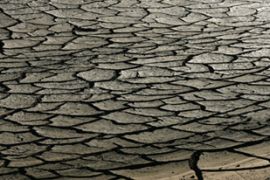‘Climate threat’ to Asia progress
Urgent action needed to prevent reversal of decades of progress, new report warns.

Published On 19 Nov 2007
“Wealthy industrialised countries must act first and fastest to cut greenhouse gas emissions, but emerging Asian countries also need to contribute to climate change mitigation,” the group said in its report released on Monday.
The report called for sustainable development policies including ending deforestation as well as promoting energy efficiency and environmentally sensible renewable energy sources.
Suffering communities
It said communities across the region were already feeling the effects of climate change and those people face a dire future unless the international community acts at next month’s climate change conference in Bali, Indonesia, to control rising greenhouse gases.
| Link |
Saleem Huq, a coalition spokesman, said “we must make our voices heard and demand international leaders take urgent and ambitious action” before the Bali meeting.
“Without this, Asia’s vulnerable will continue to suffer, as will communities worldwide who are contributing least to climate change but continuing to suffer the most,” he said.
The report by 35 private organisations, including the humanitarian group Oxfam and environmental group Greenpeace, comes two days after the Intergovernmental Panel on Climate Change warned that global warming is “unequivocal” and carbon dioxide already in the atmosphere commits the world to an eventual rise in sea levels of up to 1.4m.
That report found that warming temperatures could result in 75 million to 250 million people in Africa suffering water shortages by 2020 and residents of Asia’s large cities facing a greater risk of river and coastal flooding.
Severe shortages
Earlier in the year, the IPCC reported that 130 million people in Asia could suffer severe food and water shortages by 2050 unless international action was urgently taken.
Asia accounts for nearly two-thirds of the world’s population and more than half of those four billion people live near the coast, making them highly vulnerable to rising sea levels from melting glaciers.
And all are open to the vagaries of the water cycle affecting food production, Monday’s report said.
It painted a portrait of communities already struggling to adapt to changing weather patterns, noting that droughts were on the rise in China and India while Bangladesh had been hit by worsening floods and natural disasters, including Cyclone Sidr which has killed thousands of people.
Pacific island villages have been forced to relocate because of rising sea levels while melting glaciers have contributed to a decline in water run-off to countries that depend on it for drinking water and irrigation.
Oxfam International’s Bert Maerten said “the ongoing erratic weather conditions experienced the world over mean a daily struggle for the millions of poor people who rely on the land and sea for their survival”.
Source: News Agencies